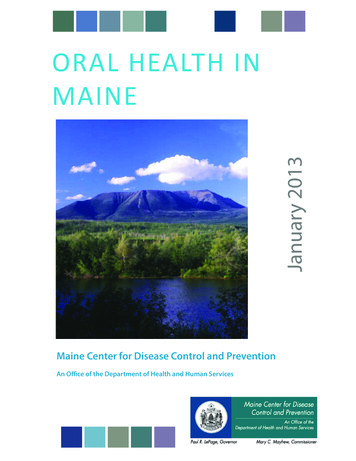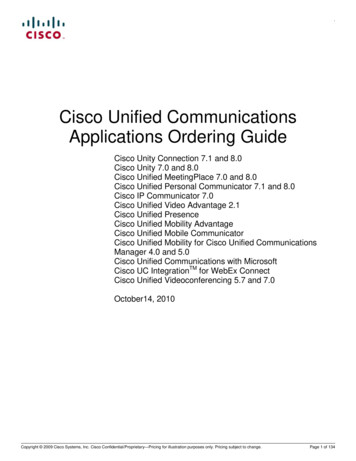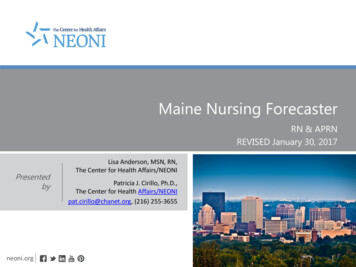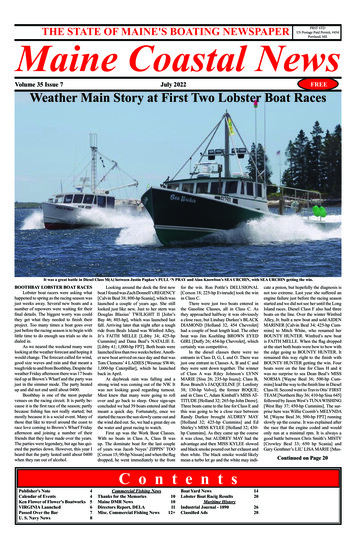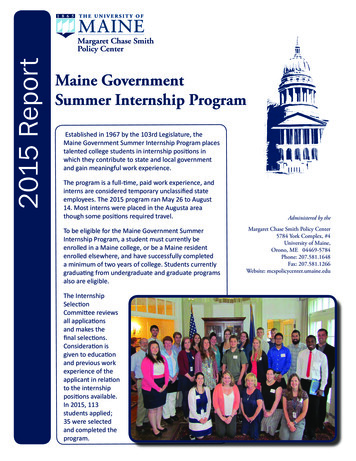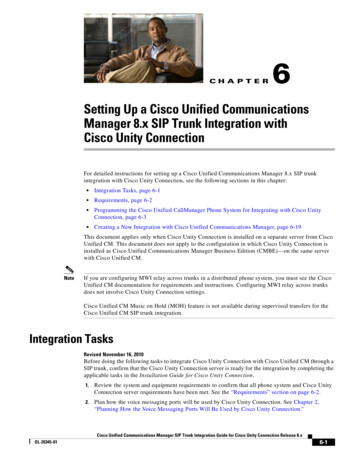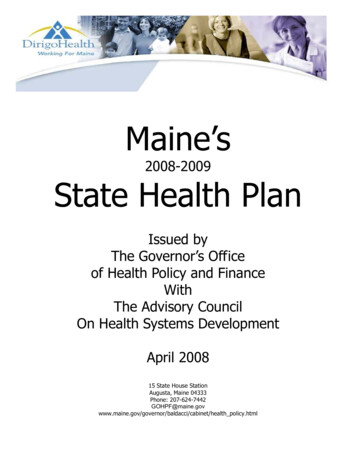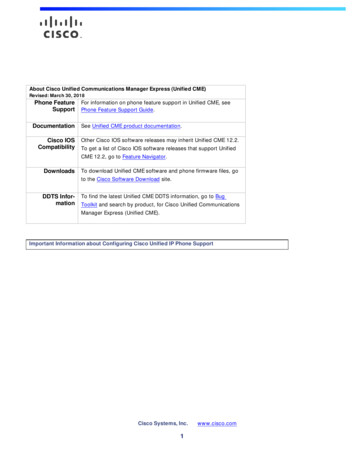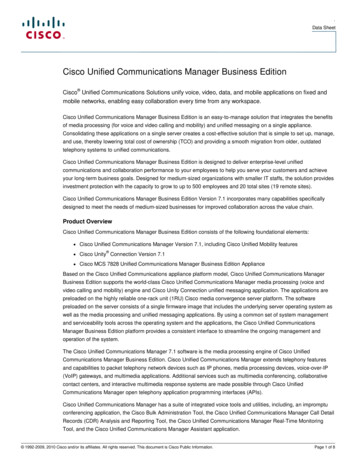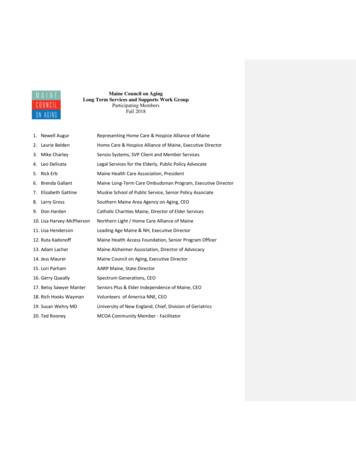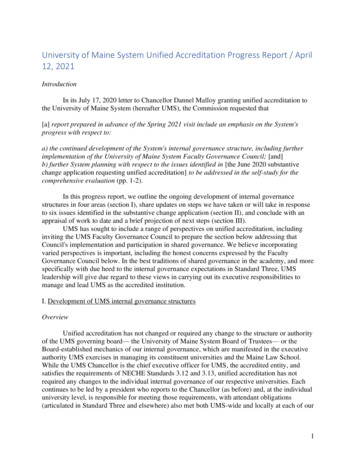
Transcription
University of Maine System Unified Accreditation Progress Report / April12, 2021IntroductionIn its July 17, 2020 letter to Chancellor Dannel Malloy granting unified accreditation tothe University of Maine System (hereafter UMS), the Commission requested that[a] report prepared in advance of the Spring 2021 visit include an emphasis on the System'sprogress with respect to:a) the continued development of the System's internal governance structure, including furtherimplementation of the University of Maine System Faculty Governance Council; [and]b) further System planning with respect to the issues identified in [the June 2020 substantivechange application requesting unified accreditation] to be addressed in the self-study for thecomprehensive evaluation (pp. 1-2).In this progress report, we outline the ongoing development of internal governancestructures in four areas (section I), share updates on steps we have taken or will take in responseto six issues identified in the substantive change application (section II), and conclude with anappraisal of work to date and a brief projection of next steps (section III).UMS has sought to include a range of perspectives on unified accreditation, includinginviting the UMS Faculty Governance Council to prepare the section below addressing thatCouncil's implementation and participation in shared governance. We believe incorporatingvaried perspectives is important, including the honest concerns expressed by the FacultyGovernance Council below. In the best traditions of shared governance in the academy, and morespecifically with due heed to the internal governance expectations in Standard Three, UMSleadership will give due regard to these views in carrying out its executive responsibilities tomanage and lead UMS as the accredited institution.I. Development of UMS internal governance structuresOverviewUnified accreditation has not changed or required any change to the structure or authorityof the UMS governing board— the University of Maine System Board of Trustees— or theBoard-established mechanics of our internal governance, which are manifested in the executiveauthority UMS exercises in managing its constituent universities and the Maine Law School.While the UMS Chancellor is the chief executive officer for UMS, the accredited entity, andsatisfies the requirements of NECHE Standards 3.12 and 3.13, unified accreditation has notrequired any changes to the individual internal governance of our respective universities. Eachcontinues to be led by a president who reports to the Chancellor (as before) and, at the individualuniversity level, is responsible for meeting those requirements, with attendant obligations(articulated in Standard Three and elsewhere) also met both UMS-wide and locally at each of our1
universities, with both the Chancellor and our presidents working together in overall fidelity tothe Standards for Accreditation.Given the above, unified accreditation has not required or resulted in a marked increasein UMS staffing. Indeed, in its January 28, 2020 action authorizing Chancellor Malloy's formalpursuit of unified accreditation, the Board explicitly noted that "It is [our] expectation thatunified accreditation will not require substantial increases to [UMS] administration orgovernance at the expense of university administration and governance or academic program andstudent support resources" (Unified Accreditation Authorization, 1/28/20).Mindful of that expectation, in August 2019 UMS recruited an Associate Vice Chancellorfor Academic Affairs from the faculty ranks at the University of Maine at Presque Isle (UMPI) tosupport unified accreditation efforts, particularly the recently formed UMS Faculty GovernanceCouncil. That person replaced a retiring Deputy Vice Chancellor with a comparable portfolio.Similarly, in January 2021, UMS appointed the University of Maine's (UM) Senior AssociateProvost and NECHE accreditation liaison officer (ALO) to serve system-wide as the AssociateVice Chancellor for Accreditation and Strategic Initiatives. (The UM Senior Associate Provostposition was not replaced. Instead, the UM Provost's office used that senior position along with avacant Director position, and reorganized these two positions into two Associate Provostpositions.) Neither of the two UMS hirings has compromised the administration or governancecapacity, academic programming, or student support resources at UMS universities, and theyhave allowed UMS to manage system-wide functions— without increasing the overall UMSemployee count— by using the expertise of staff who previously performed the same or similarfunctions at the university level.In what follows, we address four elements of our internal governance structures: (1) theongoing development and implementation of the UMS Faculty Governance Council; (2) ourmanagement structure and process for unified accreditation; (3) the governance and growth ofmulti-university academic programs; and (4) our administration of an historic 240 million grantfrom the Harold Alfond Foundation to UMS.I. (1) Advancing shared governance: implementation of the UMS Faculty Governance CouncilOverviewThe UMS Faculty Governance Council (FGC), which consists of the UMS universityFaculty Senate and Assembly Presidents and Chairs, was first convened by Chancellor Malloy inJanuary 2020 in anticipation of unified accreditation. This was a watershed moment in UMSgovernance history and was a rare convening of all UMS Faculty Senate and Assembly leadersto provide counsel for UMS. The initial meeting was followed by three more meetings over theremainder of spring 2020, during which the FGC portion of the June 2020 substantive changeapplication for unified accreditation was prepared. The depth and scope of the responsibility andauthority of the FGC is now being formulated and trialed in collaboration with UMS leadership,including the Chancellor, the Vice Chancellor for Academic Affairs, the Associate ViceChancellor for Academic Affairs, and the Vice Chancellor for Strategic Initiatives and ChiefLegal Officer.The 2020-21 academic year: actions to date2
The FGC has met seven times in the current academic year, with additional meetingsplanned through May 2021. The following represent committee actions to date:Charge. The Council is working to further define the group’s charge as presented in theUMS substantive change application. Although much of the charge as submitted seemsappropriate, FGC discussions on topics such as the multi-university academic program proposalreview process, and associated communication channels, are underway to ensure all stakeholdergroups are included and ample time is allotted for feedback from each university's facultygovernance body.The FGC has met with UMS leadership to discuss creating a process for gatheringuniversity-level feedback on UMS-wide academic initiatives (e.g. temporary grading structuresproposed as part of pandemic relief efforts; movement toward a UMS unified catalog). Theseconversations have led to further discussion of the role of faculty and faculty shared governancemodels in a unified environment. One imperative is to ensure the faculty voice is heard at thebeginning stages of new program development and related academic actions.While the Council’s work initially focused on multi-campus academic programming, themembership soon recognized the collateral task of coordinating UMS Board policy andAdministrative Practice Letters (APLs) with the tenets of the Affiliated Faculties of theUniversities of Maine (AFUM) collective bargaining agreement in service to the academicmission under unified accreditation. In reviewing possible processes for new academic programproposals as outlined in the APLs, the university Provosts and the FGC members agreed that theCouncil should be the initial group to review proposal requests. The VCAA used that feedback towork with the FGC to begin a review process that outlines administrative procedures and theflow of information about program proposals. The FGC appreciates its expanded role inreviewing APLs and establishing effective lines of communication.Charter. Elements of the FGC charter, including council membership and charge, havebeen discussed at the Council level. Feedback on the FGC membership has been solicited fromeach of the university faculty governance bodies and continues to be gathered and considered ascharter elements are being revised. Upon completion, the charter will require ratification by eachuniversity faculty governance body (senate or assembly) before it officially takes effect.FGC membership has been established as follows, having been initially voted on at theFGC's February 2021 meeting, revised, and voted on again at its March 2021 meeting. Thefollowing information about the charter is proposed by the FGC pending ratification by all UMSuniversity-level faculty governance bodies:As a body, the Faculty Governance Council consists of a delegation from each namedUMS university and the Maine Law School. Each delegation will consist of one to four membersto include1. The Chair/President of each UMS university faculty governance body, and the followingoptional members as determined by the individual campuses:2. The Vice Chair/President of each UMS university faculty governance body. If a ViceChair/President is unable to serve, a university may, if it wishes, substitute anotherrepresentative;3. An FGC representative provided by election or by faculty governance body appointmentand serving a term of three years;3
4. A past Chair/President of a UMS university faculty governance body who a) previouslyserved on the FGC, and b) continues to hold a faculty position at the UMS university.On all matters determined by vote, each delegation will cast a single vote. The Councilwill also include the following non-voting ex officio members:1. An AFUM Executive Board member (UMS labor relations union for full-time faculty).2. A VCAA staff member.AppraisalA challenge facing the FGC has been the rapidity with which the changes associated withcertain provisions of unified accreditation have been implemented. The FGC looks forward to itscontinued work with the UMS administration and the Board, and hopes that a more deliberateand nuanced implementation can occur at a pace that is acceptable to all stakeholders, especiallythe UMS combined student body. The FGC members are attempting to appreciate the demandsfor action, such as the seemingly instant creation of the single UM and UMM course catalogwhile receiving directives to create the UMS-wide unified catalog. Imperial action on suchcritical items as faculty-authored course descriptions can only be viewed as a threat to facultyacademic sovereignty. In such processes, the FGC seeks to be nimble, deliberate, and respectfulwhile accessing and facilitating the full opportunities afforded by unified accreditation. As notedby Chancellor Malloy in his November 2019 “Summary of Process Considerations”:Trust is the foundation to any successful collaborative endeavor; to not invest timein building trust could negatively impact this work, which is so important to ourfuture and that of our state. Transparency is also key, and the Chancellor hasrepeatedly stressed his commitment to transparency (p. 28).Council members have reported pleasure with the collaborative nature of the Council andthe direct connection with the UMS administration. On multiple occasions, it has been helpful tohave a forum that provides an opportunity to touch base with other UMS universities to find outhow they are handling a particular issue or to get more information about their policies. Thesecollective conversations have resulted in unified faculty responses to UMS actions— forexample, a recent change in retiree health benefits, and proposed changes to Board Policy 310(Tenure).Due to a long series of actions taken by UMS leadership in the past that have beenviewed as detrimental to the functioning of our individual universities— for example, theadoption of cumbersome software not well suited to the tasks they are supposed to perform, suchas Concur and HireTouch, or such questionable initiatives such as the Academic PortfolioReview and Integration Process (APRIP, launched in summer 2014), faculty’s initial reaction tomost UMS initiatives tends toward distrust. This distrust extends to a certain extent toward theFGC, which is why it is imperative that the FGC's charter be completed and sent to the universityfaculty senates and assemblies for ratification. Faculty continue to have many questions aboutthe effect unified accreditation will have on the individual universities. We have made significantprogress in defining the role of the Council, but there is more work to do to ensure clearcommunication and transparent processes going forward.Conclusion4
The founding principles for the authority and responsibility inherent to the FGC can befound in several governance declarations located in UMS Board Policy and in various individualUMS university governance documents (e.g. “The Governance Document of the University ofSouthern Maine” 2020, Article I Shared Governance) with buttressing statements such as the“Statement on Government of Colleges and Universities.”1 In brief, faculty are charged with the“primary authority over the academic area, including such matters as the curriculum, standardsof faculty competence, and standards of student achievement.”2 These responsibilities maymanifest themselves in a variety of forms, including faculty hiring, review, and promotion;development of individual courses, entire curricula, and certifications/degrees; and all manner ofacademic infrastructure including committees, councils, departments, schools, and colleges.The conclusion of the June 2020 UMS substantive change application referenced theAssociation of Governing Boards’ Board of Directors 2017 Statement on Innovation, whichemphasizes the imperative for “innovation” in service to the development of “fresh approachesfor delivering” on a university’s mission. UMS, through each of its eight unique educationalunits highlighted above, prospers through the diversity and hybrid vigor of these institutionscollectively meeting the evolving and sometimes revolutionary demands of Maine’s studentcitizens. The expectation of each member of the FGC is that the UMS administration willoptimize the “collective intelligence” 3 of the UMS faculty community through authentic,mutually respectful, and bi-directional engagement with the FGC in shared governance.Specifically, the FGC anticipates meeting its charge by facilitation and constructivecriticism of both faculty- and administration-generated proposals for improvement andmodification of our joint academic enterprise: UMS. We mirror UMS's expectation that “UMS’sunified accreditation model and university collaborations, as well as a strong partnership withNECHE to bring them all about, serve as a fresh reminder that innovation in academicgovernance and student service is still possible”4 in service to the varied needs of our state,region, and country.The FGC assumes with intention a key role in exercising and documenting successfulshared governance within UMS. This role is captured in NECHE’s Standard Three: Organizationand Governance, wherein UMS is charged to demonstrate “through its organizational design”that it “creates and sustains an environment that encourages teaching, learning, service,scholarship, and research and creative activity." We can only do so if UMS administrationadheres to its “Guiding Principles for Unified Accreditation” (p. 18-19).I. (2) Management of unified accreditation via our tripartite oversight structureManagement structure1American Association of University Professors Policy Documents and Reports, 10 th ed, Washington: AAUP, 2006(p. 136).2Gaff, J.G. 2007. What if the faculty really do assume responsibility for the educational program? AAC&U, LiberalEducation 93(4).3UMS, “Substantive Change Request for Unified Accreditation of the University of Maine System” June 10, 2020,p. 18.4 Ibid, p. 53.5
In Fall 2020, UMS adopted a carefully delineated structure for managing our unifiedaccreditation work. The Executive Sponsor of the work is Chancellor Malloy. The second tier ofaccountability is an Executive Steering Committee comprising our six university presidents; theVice Chancellor for Finance Administration and Treasurer; Vice Chancellor for AcademicAffairs; Vice Chancellor for Strategic Initiatives and Chief Legal Officer; and the Provosts of ourtwo largest universities, the University of Maine and the University of Southern Maine.The third level of oversight is a Project Management Team tasked with organizing anddocumenting the unified accreditation work and communicating appropriately with faculty, UMSand campus leaders, the Board of Trustees, and other stakeholders. That team comprises theAssociate Vice Chancellor for Accreditation and Strategic Initiatives; Associate Vice Chancellorfor Student Success and Credential Attainment; Associate Vice Chancellor for AcademicAffairs; the University of Southern Maine's Vice Provost for Accreditation and Mission; and theUMS Director of Organizational Effectiveness. The Associate Vice Chancellor for Accreditationand Strategic Initiatives chairs the Project Management Team and serves as its liaison to theExecutive Steering Committee. He is responsible for day-to-day activity in various dimensionsof unified accreditation, and is the UMS ALO to NECHE. He works in close coordination withthe Vice Chancellor for Strategic Initiatives and Chief Legal Officer, and the Vice Chancellor forAcademic Affairs.Unified accreditation in action: two examplesAt its core, unified accreditation allows UMS's constituent universities and the MaineLaw School to share academic programs and resources far more efficiently, and in ways farbetter suited to serve Maine's people, even as the universities and Law School retain theirindividual missions—complementary to the UMS mission as a whole— and their ability todeliver properly resourced, high quality, locally controlled academic programs and publicservices on their own. With unified accreditation now in place, teams of UMS faculty, staff, andadministrators are actively working to remove historic barriers to student success, open doors tomulti-university academic programming and partnerships, and increase opportunities for facultyto participate in funded research and/or graduate teaching with colleagues at other UMSuniversities.Two examples of unified accreditation in action are the Unified Catalog initiative and theResearch Faculty Affiliates and Exchange program. We briefly describe each to illustrate howunified accreditation is helping us expand opportunities for students and faculty and meetpractical needs in a timely and effective way.Unified Catalog initiative. Each UMS university's academic programs and courses arecurrently housed in separate, university-specific "instances" in our "MaineStreet" (PeopleSoft)academic catalog, with limited functional capacity for interaction. As a consequence, there ispresently no way for data about courses, credit transfer, registration, billing, and relatedfunctions to be shared easily between or among UMS universities via MaineStreet. What shouldbe a seamless academic experience supported by an efficient, behind-the-scenes flow ofinformation available to students and faculty across UMS institutional boundaries is insteadfrequently frustrating for students, faculty, professional advisors, and academic and studentsupport staff.The nature and scope of the barriers at issue— rooted in outdated database and software"walls" dividing the separate university MaineStreet academic catalogs— are not mysterious. A6
pair of UMS-led working groups identified the relevant set of student barriers in 2014-15, afinding subsequently affirmed by an external consultant's report in 2015. In plain terms: there aretoo many impediments hindering our academic processes and intra-UMS interactions.To improve the student academic experience and increase system-wide academicaccessibility, we began work in February 2021 on the Unified Catalog initiative, a project drivenby three interconnected goals. First, by September 2022 we will bring all of our undergraduateand graduate course offerings together in a single data housing and make them visible andsearchable for all students regardless of home institution. In parallel with and extending fromthat work, we will move systematically through our list of known barriers to student academicsuccess—technical, structural, procedural, and cultural— and eliminate them. Finally, we willremove barriers to faculty participation in multi-university academic programs and partnerships.This initiative will be led by the Vice Chancellor for Academic Affairs and the AssociateVice Chancellor for Accreditation and Strategic Initiatives in partnership with a teamrepresenting administrative and professional staff from all of our universities and from UMS IT.The team will also include representation from the UMS Faculty Governance Council andextensive faculty participation across UMS.Research Faculty Affiliates and Exchange program. This innovative program has beendeveloped by the President of the University of Maine (UM), who also serves as the UMS ViceChancellor for Research and Innovation, the President of the University of Maine at Augusta(UMA), and UM's Director of Research Development. It is managed by an Intercampus PlanningCommittee led by UM's Director of the Office of Research Development, UMA's Provost, andthe University of Maine at Presque Isle's Dean of Arts and Sciences. The program's coreobjectives are:1. To advance unified accreditation via a faculty registry of teaching and researchexpertise.2. To offer formal affiliation with the UM Graduate School to faculty at other UMSinstitutions seeking to pursue graduate teaching and research ties and opportunities.3. To provide access to research-active colleagues, research infrastructure, and graduatestudents to increase UMS research competitiveness and intercampus collaboration.4. To offer (initially on a pilot basis) sabbaticals to UM for faculty at other UMSuniversities coupled with trained graduate students providing teaching replacement at thesending universities.Corresponding goals include highlighting the teaching and research expertise of UMSfaculty; credentialing faculty in their respective disciplines across UMS; providing opportunitiesto teach at the graduate level and to serve students on dissertation and thesis committees as eitherchairs or associate committee members; and using the program as a means of sharing andhighlighting UMS expertise with external audiences (e.g. state government, external researchcollaborators, internship and commercialization partners, student recruitment/enrollmentmanagement partners, and others).The Research Faculty Affiliates and Exchange Program is expected to launch in pilotform in summer 2021, and will be open to any UMS faculty interested in applying for a formalresearch affiliation with UM, the state's land-, sea-, and space-grant research institution.Participation in the program will give UM faculty affiliates access to all of the UM services andsupports for research; allow them to partner with successful UM research faculty; allow them to7
work with graduate students based in UM programs; afford them opportunities to teach graduatecourses; and provide ample opportunities to pursue new projects and ideas with UM faculty,centers, and institutes.I. (3) Multi-campus academic programs: governance and growthDeveloping oversight and refining and aligning program approvals and policiesThis section of the report responds to the Commission's request for an update on UMS'sprogress in developing oversight of multi-university (multi-campus) programs, and in refiningand aligning Board-established program approval processes and policies under unifiedaccreditation.In the "Guiding Principles for Unified Accreditation"— developed and adopted in 2019as UMS prepared its substantive change application requesting unified accreditation status—Principle Two affirms thatPursuant to University of Maine System Board Policy 212 and the University of Maine SystemStatement on Shared Governance, faculty will retain all rights to academic freedom and sharedgovernance to develop academic policy, curriculum and faculty appointment and promotion andtenure standards on their campuses and as necessary for multi-campus programs developedunder a unified accreditation (UMS Guiding Principles for Unified Accreditation).To align this ongoing commitment with the Commission's expectation of increased UMSoversight of academic programming— as required in a unified environment, and specificallywith respect to multi-university programming— the UMS Vice Chancellor for Academic Affairs(VCAA) has established a formal plan to refine the UMS program approval process.The University of Maine System Board of Trustees develops and approves all UMSpolicies. The Chancellor and UMS senior staff develop corresponding procedures, includingacademic procedures, which are codified and housed in the form of Administrative PracticeLetters (APLs). APLs explicate procedures and practices in support of Board policies addressingall facets of activity in UMS and its constituent universities and the Maine Law School:academic affairs, student affairs, finance and administration, among others.In a process launched in January 2021, the VCAA and his staff have copied each APLwhose content addresses academic matters into a editable document that has then been linked toa project management tracking software. The APLs have been prioritized within that software forreview by the VCAA and the Chief Academic Officers Council (CAOC), a body comprising thesix UMS university Provosts, the Maine Law School Vice Dean, the University of Maine atMachias (UMM) Head of Campus, and the VCAA and his staff. The VCAA has shared anddiscussed the revised review process with various stakeholders, including university-level facultysenates and assemblies (via the UMS Faculty Governance Council); the CAOC, the Presidents'Council (comprising the Chancellor, the six university Presidents, the Maine Law School Dean,and UMS senior staff, including the VCAA), the six universities' faculty representatives to theBoard, and the Board's Academic and Student Affairs (ASA) Committee. ASA is the Boardgovernance body responsible for development and initial review of academic-related policies,procedures, and practices.Timeline8
Beginning in spring 2021, the VCAA will deliver the first of the academic-related APLsto the Faculty Governance Council for its review. Their joint goal is to align revised APLs withexisting practice(s) in keeping with the Guiding Principles for Unified Accreditation.Along with the other leadership groups listed above, the Faculty Governance Council istasked with confirming that academic-related processes continue to ensure that no actions takenunder unified accreditation diminish local (university-level) decision-making about academicprogramming. Rather, the Council will exercise its role within shared governance to establishthat policies and procedures under review support university-level academic work while offeringappropriate UMS-level monitoring and evaluation.The VCAA and his team and the Faculty Governance Council anticipate completing twopolicy revisions before June 2021. They will resume their work in September 2021 by addressingfour additional APLs. Many of the UMS APLs correspond to Board policies maintained in thePolicy Manual. As work on APLs is completed, complementary attention will be paid to theseBOT policies to ensure that our policies and procedures are appropriately updated and aligned.I. (4) UMS TRANSFORMS initiative: administration of the Harold Alfond Foundation grantAdministrative structure and processOn October 6, 2020, the Harold Alfond Foundation announced 500 million ininvestments to be made in several organizations and institutions in Maine. The next day, UMSand the Alfond Foundation jointly announced that 240 million of that total would come to UMSand its universities.UMS's stewardship of the historic 240 million grant, the largest gift ever made to apublic higher education institution in New England, begins with an Executive Leadership Groupchaired by Chancellor Malloy. UMS will manage the gift as a grant; the co-principalinvestigators for that purpose are the UM President—who also serves in the complementary roleof UMS Vice Chancellor for Research and Innovation— and the UMS Vice Chancellor forStrategic Initiatives and Chief Legal Officer. The Executive Leadership group includes a projectdirector (UM's Vice President and Chief of Staff) and a financial director (the UMS ViceChancellor for Finance and Administration and Treasurer).In addition, a project operations group manages match and fundraising, budget and grantmanagement and financial reporting, communications and publicity, and capital project planning.Each of the four major initiatives of the grant is headed by a lead and one or more co-leads. Thegrant, its aims, and its administrative structure are collectively called UMS TRANSFORMShttps://www.maine.edu/transforms/.The major grant initiatives are: Black Bear Athletics ( 90M grant in support of UM athletics, with a 20M match)Student Success and Retention ( 20M grant in support of all UMS universities, with a 25M match)The creation of the Maine College of Engineering, Computing, and Information Science( 75M grant with a 75M match)Advancing the Maine Graduate and Professional Center ( 55M grant with a 50Mmatch)9
Regular Executive Leadership Group meetings and check-in meetings with the leads andco-leads commenced in November 2020. As of January 2021, the leadership had begun topresent its work to various internal groups on re
unified accreditation will not require substantial increases to [UMS] administration or governance at the expense of university administration and governance or academic program and student support resources" (Unified Accreditation Authorization, 1/28/20). Mindful of that expectation, in August 2019 UMS recruited an Associate Vice Chancellor
